Key takeaways:
- Proper horse care involves understanding individual needs, including diet, hoof care, and regular health checks.
- Subtle adjustments in care, like fitting blankets and feeding schedules, can significantly impact a horse’s behavior and health.
- Daily routines, including grooming and exercise, enhance the bond between horse and owner while promoting well-being.
- Awareness of common health issues, such as laminitis and colic, is crucial for proactive horse management and care.
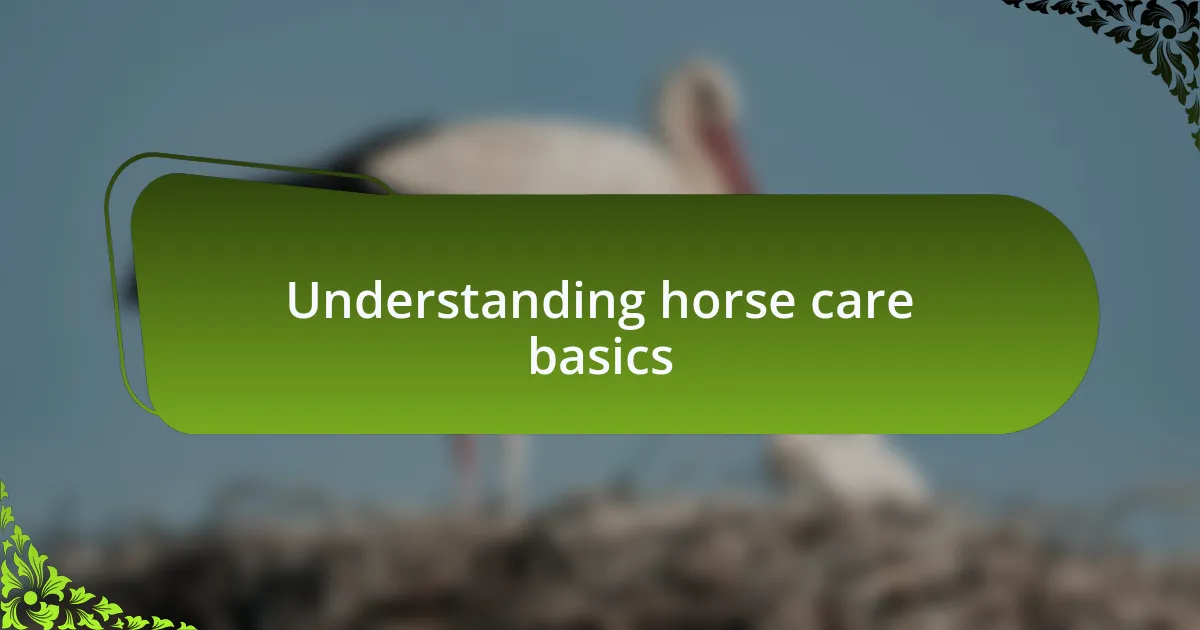
Understanding horse care basics
When I first began caring for horses, I was surprised by how much attention to detail is required. It’s not just about feeding and grooming; it’s understanding their individual needs. Have you ever noticed how a horse reacts when it feels truly comfortable? That calm, relaxed demeanor is a direct result of proper care and a secure environment.
Feeding is more than just filling a bucket. I learned that every horse has its own dietary requirements based on age, activity level, and health status. Watching my horse thrive as I adjusted his feed was eye-opening. It made me realize how crucial nutrition is to their overall well-being. What’s in their food affects their mood, energy, and even coat health.
Maintaining proper hoof care was, surprisingly, one of the most enlightening experiences for me. The first time I saw a farrier trim my horse’s hooves, I couldn’t believe how significant such a small part could be for their comfort and health. Without regular maintenance, a horse can suffer pain or injuries, which I’ve come to view as a ripple effect impacting their entire life. Have you ever thought about how much horses rely on their feet? They need good footing for daily activities, and by understanding this, we can ensure they lead happier lives.
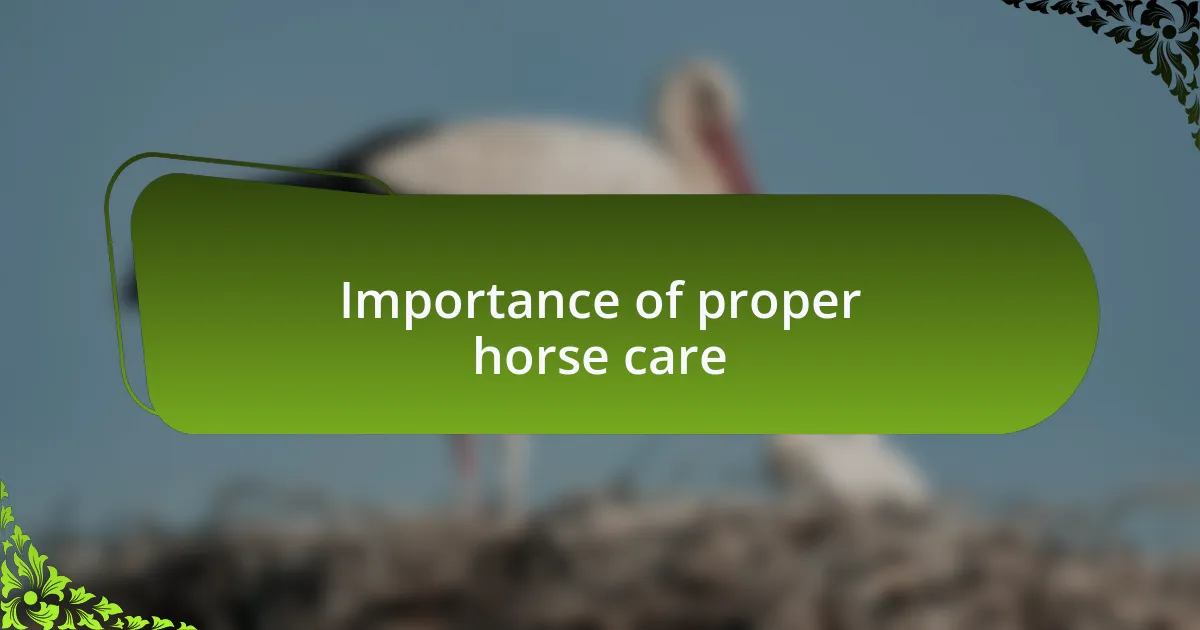
Importance of proper horse care
The significance of proper horse care extends far beyond basic maintenance; it fundamentally shapes a horse’s behavior and attitude. I’ve observed that when horses receive the right attention, they blossom into more relaxed and approachable animals. Have you ever noticed how a well-cared-for horse tends to interact differently with people? It’s as though their trust increases, making them more willing partners.
It’s fascinating how the subtle details of daily care can dramatically impact a horse’s health. One winter, I noticed my horse becoming a bit listless and cranky, and it made me realize that the cold rains had affected his blanket fitting, causing discomfort. Addressing that small issue returned him to his playful self almost overnight. It’s these tiny adjustments that remind us how attuned we must be to their needs.
Of course, proper horse care is also about prevention. I remember a day at the barn when we discussed the importance of vaccinations and regular vet checks. It reinforced how proactive measures can prevent serious illnesses we might not even see coming. Isn’t it reassuring to know that staying ahead of potential health problems translates to a longer, happier life for our horses?
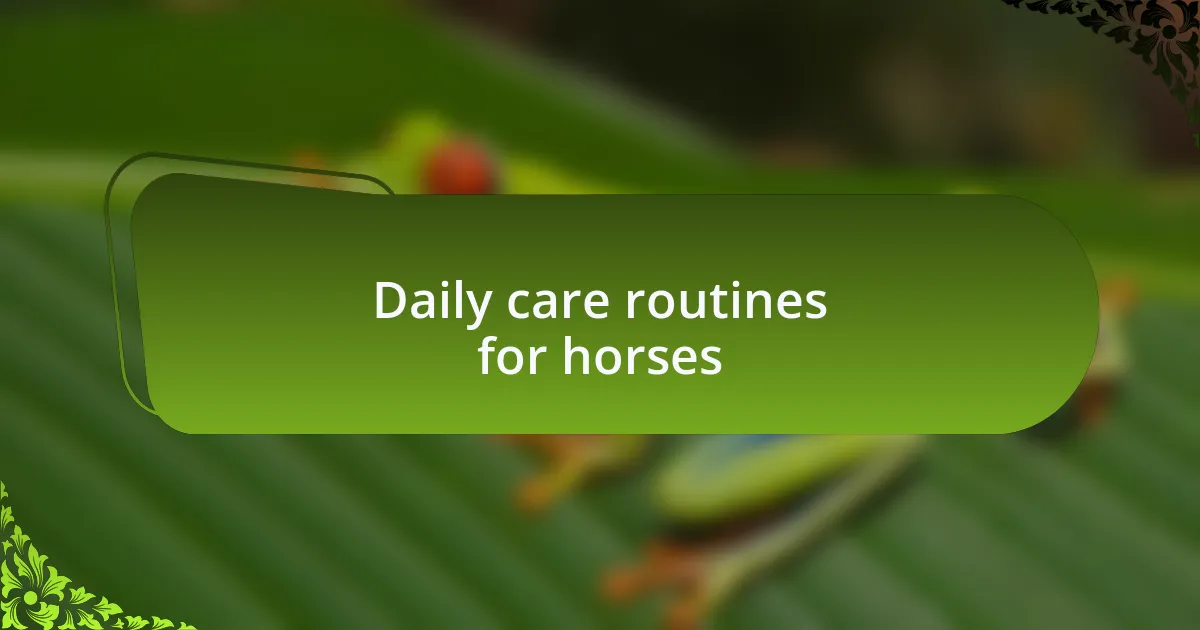
Daily care routines for horses
Daily care routines for horses involve several essential tasks that keep them healthy and happy. Every morning, I find it’s crucial to check each horse thoroughly. One day, while grooming my mare, I discovered a small cut on her leg that I might have missed if I hadn’t been paying close attention. These moments reinforce how important it is to develop a routine that allows for observation and care.
Feeding is another key component of a horse’s daily life. I’ve learned that sticking to a consistent feeding schedule helps regulate their digestive system, which is vital for their overall health. Have you ever noticed how calming it is to watch a horse happily munching on its grain or hay? It gives them a sense of security, knowing that their needs are being met regularly.
Exercise should be incorporated into each horse’s daily routine as well. Whether it’s a long ride or a simple walk around the paddock, getting moving not only keeps them physically fit but also improves their mood. I remember a particularly warm afternoon when I took my gelding for a quick trot; the joy in his strides reminded me just how much he relishes the time outdoors. It’s these shared experiences that deepen the bond between horse and rider while also ensuring they are well-cared for.
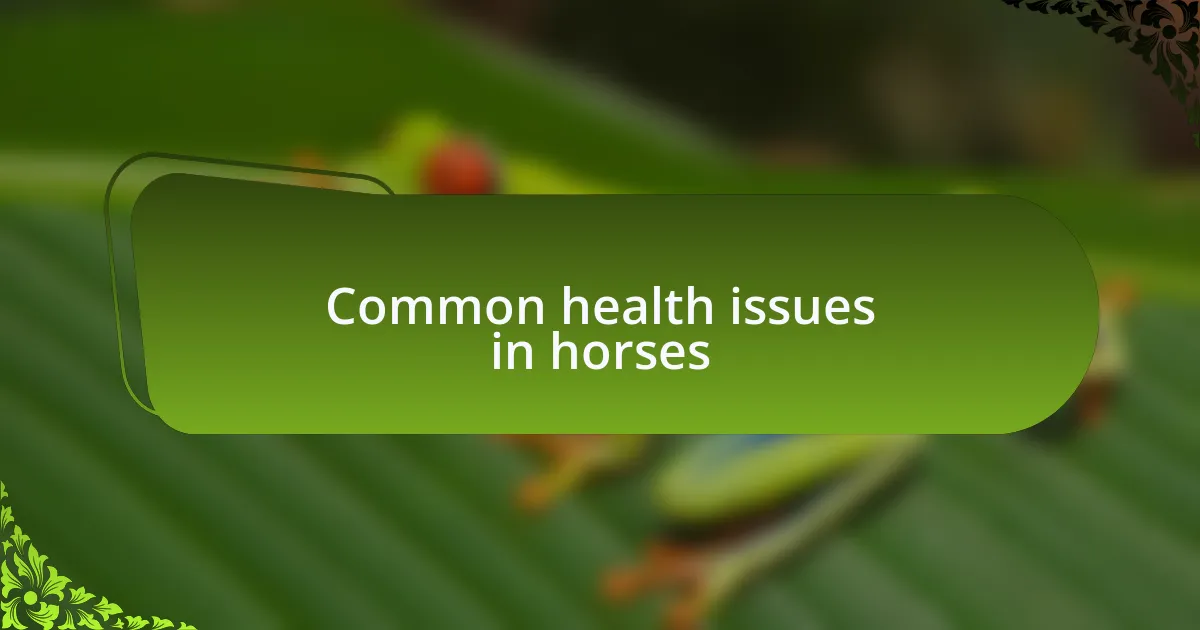
Common health issues in horses
Common health issues in horses can often stem from their living conditions and management. I remember a time when one of my horses developed laminitis after we had a particularly lush spring. It was a scary experience, as it not only caused her pain but also required a complete overhaul of her diet and exercise routine. Have you ever faced a similar situation where a sudden change affected your horse’s health? It taught me the importance of monitoring their environment and being proactive about changes in diet.
Colic is another health concern that every horse owner should be aware of. One afternoon, I watched in panic as my gelding started to exhibit signs of discomfort; it turned out to be a mild case. It was an eye-opening moment that underscored the need for awareness. Constantly, I check for any signs of distress, whether it’s rolling, pawing, or loss of appetite. Have you ever considered that the smallest change can indicate a larger problem?
Additionally, respiratory issues can quietly creep up, especially in horses exposed to dust or moldy hay. I recall a chilly winter when a friend’s horse developed a cough that wouldn’t go away. It was alarming, and it reminded me to always provide fresh, clean bedding and high-quality feed. Understanding these common issues makes a huge difference in managing your horse’s health effectively. How often do you assess your horse’s living conditions to prevent such problems?
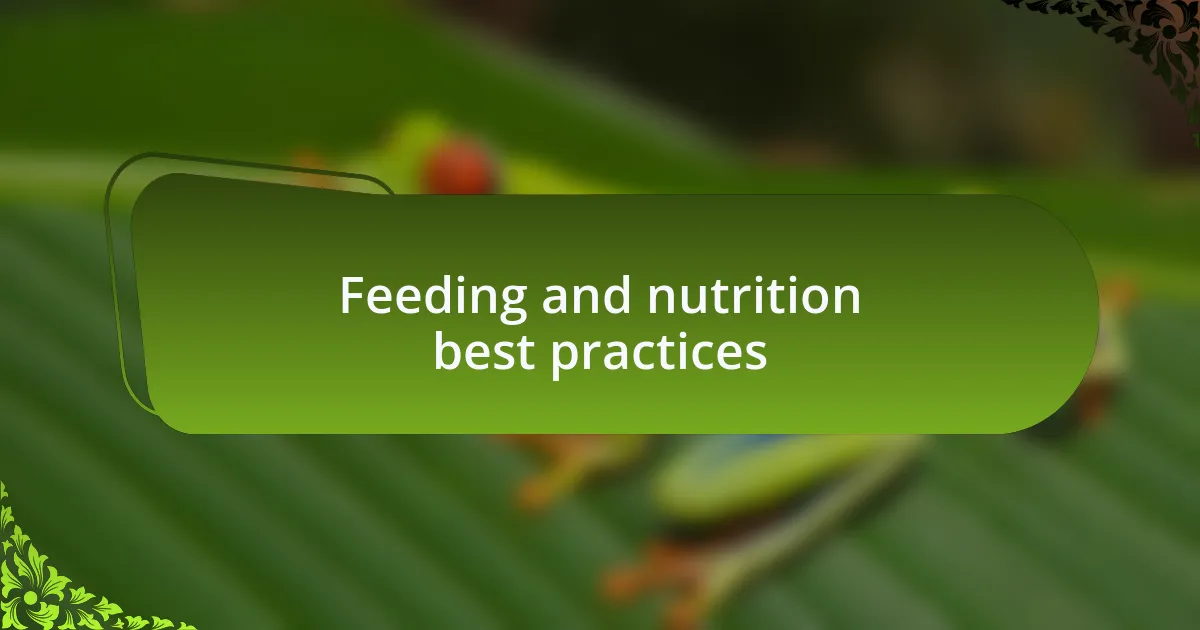
Feeding and nutrition best practices
Feeding your horse a balanced diet is essential for their overall health and performance. I vividly recall the first time I switched my mare to a high-fiber diet; the improvement in her energy levels and coat condition was remarkable. Have you ever noticed how subtle dietary changes can lead to significant transformations? It’s a constant reminder that what we feed our horses directly impacts their well-being.
Pay close attention to the quality of hay and grain you offer. I once made the mistake of purchasing hay from a discussion forum without thoroughly inspecting it, only to find mold lurking within. That error taught me an invaluable lesson: the importance of quality over convenience. What kind of hay does your horse prefer, and how do you ensure its freshness? I’ve learned that regularly checking for dust and mold not only keeps them happy but prevents costly health issues down the line.
Lastly, remember to consider your horse’s individual needs based on age, workload, and health status. I’ve seen how my senior horse requires more concentrates to maintain weight, especially during the colder months. It’s a dance of sorts, adjusting their diet as circumstances shift. How often do you reevaluate your horse’s nutritional requirements? For me, it’s become a routine practice that ensures my horses remain strong and vibrant.
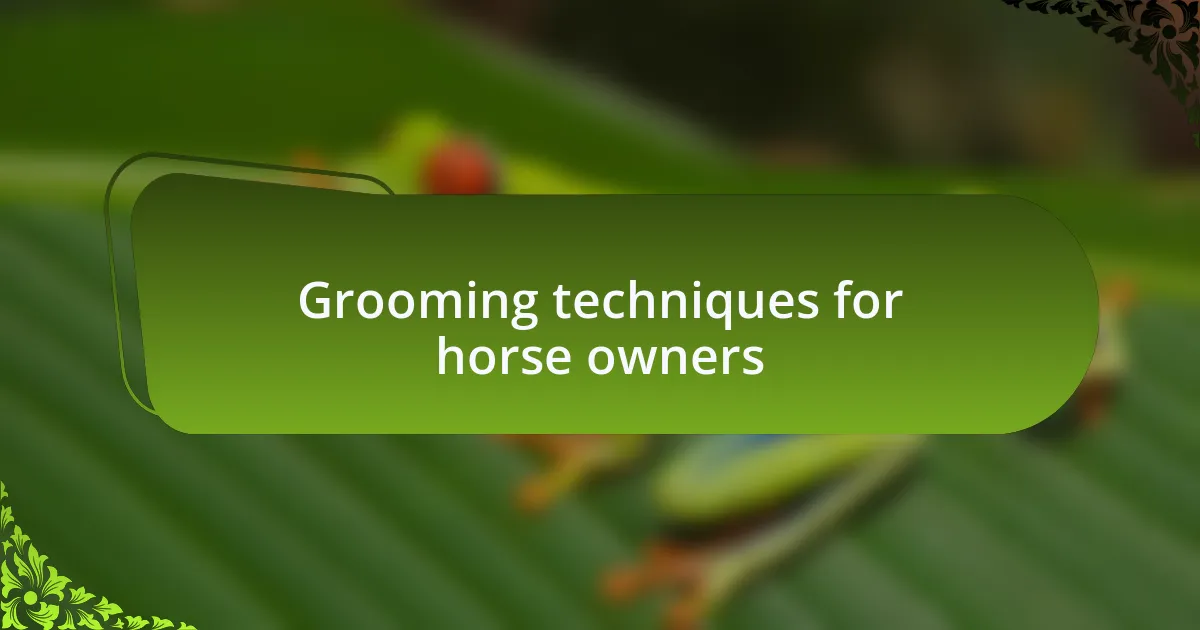
Grooming techniques for horse owners
Grooming is not just a daily chore; it’s a bonding experience that enhances your relationship with your horse. I remember when I first adopted my gelding, I spent hours brushing him, and those quiet moments together really helped build trust between us. Have you ever felt a deep connection during grooming sessions? It’s during these times that I discovered how responsive my horse was to gentle touches – he seemed to relax under my hands, and it brought us closer.
Utilizing the right tools is crucial for effective grooming. From hard brushes for shedding to soft ones for sensitive areas, each tool plays a role. I learned this the hard way when I used a stiff brush on my thoroughbred’s delicate skin, only to end up with a few irritated patches. Which tools do you swear by? I personally favor a curry comb for removing dirt and loose hair, as it gently stimulates the skin and gives my horse a massage he thoroughly enjoys.
Lastly, don’t underestimate the importance of routine grooming in maintaining your horse’s health. I’ve noticed that regular checking for bumps or skin issues while grooming can prevent bigger problems down the line. Have you ever spotted something unusual during grooming? It happened to me when I found a small sore on my mare’s leg early on, and it turned out to be nothing serious, but it reinforced how vital grooming is for holistic care. Regular attention not only keeps them looking good but really allows you to be in tune with their overall condition.